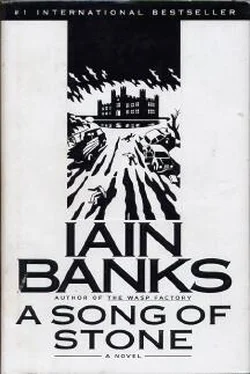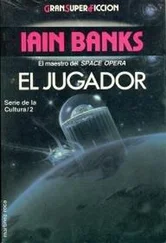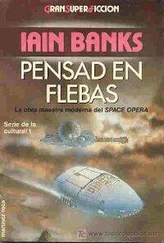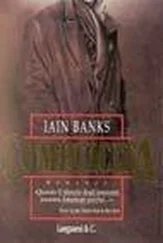Iain Banks - A Song Of Stone
Здесь есть возможность читать онлайн «Iain Banks - A Song Of Stone» весь текст электронной книги совершенно бесплатно (целиком полную версию без сокращений). В некоторых случаях можно слушать аудио, скачать через торрент в формате fb2 и присутствует краткое содержание. Год выпуска: 1997, Жанр: Современная проза, на английском языке. Описание произведения, (предисловие) а так же отзывы посетителей доступны на портале библиотеки ЛибКат.
- Название:A Song Of Stone
- Автор:
- Жанр:
- Год:1997
- ISBN:нет данных
- Рейтинг книги:4 / 5. Голосов: 1
-
Избранное:Добавить в избранное
- Отзывы:
-
Ваша оценка:
- 80
- 1
- 2
- 3
- 4
- 5
A Song Of Stone: краткое содержание, описание и аннотация
Предлагаем к чтению аннотацию, описание, краткое содержание или предисловие (зависит от того, что написал сам автор книги «A Song Of Stone»). Если вы не нашли необходимую информацию о книге — напишите в комментариях, мы постараемся отыскать её.
A Song Of Stone — читать онлайн бесплатно полную книгу (весь текст) целиком
Ниже представлен текст книги, разбитый по страницам. Система сохранения места последней прочитанной страницы, позволяет с удобством читать онлайн бесплатно книгу «A Song Of Stone», без необходимости каждый раз заново искать на чём Вы остановились. Поставьте закладку, и сможете в любой момент перейти на страницу, на которой закончили чтение.
Интервал:
Закладка:
Then there is a creaking, cracking noise from above me, and then a disorienting sense of movement, and a deep, surrounding rumbling noise. I stare wildly around, wondering what's happening, and see the world outside the door moving, and cannot believe my eyes, and only then realise that the mill itself is rotating. The force of the breeze must have just become sufficient to make the airy wooden circle turn to face into the flow of air. Grinding and resounding, with many a mournfulsounding moan and painful creak, the mill turns, and as though its sails and gears and stones are lode eventually it settles its face towards the bitter north. I watch the view through the door change, sliding away from the road and the forest on its far side, taking away the sight of the dead men and gradually slowing and steadying and grumbling to a stop, to display the way west, back down the road it seems I'm fated never to travel to the end of but always to return down, the road back to the castle.
I look again at the lieutenant. The breeze tumbles in through the open door and disturbs her flour greyed curls. I put down the gun. I cannot do this. Walking to the doorway, feeling faint and dizzy again, I look out into the dawning day and take some deep breaths. The ragged, half empty arms of the sails are lifted as though in vain entreaty to the wind, feathered and powerless.
And yet, some part of me still says: Exert, assert your self… but does so too well, its sentence pronounced too clearly. I do not know, I cannot impersonate such vivacious anger. It is known to me empirically, but no more, and that knowledge pins me.
I look back at her. What would she do? And yet, should I even care what she would do? She sits there, nearer death than she can know, and in my power. I am in control, I have prevailed, even if only by luck. What would I do? What should I do? Be like myself, act as normal? And yet what is ever normal, and what value or utility has normality in these abnormal times? Less than nothing, it seems to me. Therefore act abnormally, act differently, be irregular.
The lieutenant deserves my ire for all she's taken from us. including the chance that we had to escape, those few days ago when she stopped us on this same road. That first interference led to all the rest; to the taking of our home, the destruction of our family's inheritance, to the lieutenant taking my place with you and as must have been her intent my planned murder. That first shot of hers, that spun me, dropped me; that was in the heat of the moment. But when they put me in the jeep, took me away from the castle, in the traditional hour of execution, that was cold blooded, my dear.
The tolerance I've exhibited and felt towards our lieutenant has been a relic of more civilised times, when the ease of peace means we may allow each other such genteel leeway. I thought, through a display of civility, to show my contempt for these desperate days and our lieutenant's brash assumptions, but forced beyond a certain point, such politeness becomes self defeating. I must allow myself to be infected by the violent nature of the times, to suck in their contaminating breath, take on their fatal contagion. I look at the gun in my hand. Still, this is the lieutenant's way. To kill her with the weapon she might have used to kill me might he poetic just or not but it seems like too easy a rhyme to me.
The wind caresses my cheek and tugs at my hair. The mill flexes, seems about to move again, then settles once more. I put the gun down on the floor, then pick it up again, check that its safety catch is on and stuff it in the waistband of my trousers at the small of my back. I look quickly about, searching for a. lever, some control.
I run up the splintered stairs, going briefly dizzy with the sudden effort, then in the upper darkness of wooden gears and spars and bins and hoppers, at last I find a wooden lever like something out of an old railway signal box, attached by rusted iron rods to a wooden iris in the mill's wall pierced by a horizontal axle that disappears through it to the outside. I pull the wooden handle. A noise like a sigh, and a groan. A sensation of tapped power shakes the mill, and the horizontal shaft starts to rotate slowly, turning the creaking, grinding, wood toothed gears that convert the power from horizontal to vertical and send it to the floor below, and to the stones. I race back down again, almost failing at the bottom in my haste. The great millstones are trundling slowly round their track, shaking the whole mill with their low, deliberate thunder. They slow perceptibly as I watch, the wind outside losing some strength, then slowly they speed up again as it stiffens once more. Here is a different end, here is a fitter poesy. A strange excitement shakes me and sweat breaks on my brow. I must do this while the resolution still burns in me.
My hands slip easily under the lieutenant's armpits and I pull her up. She makes a small moaning sound. I place her by the great stone circle of the mill wheels” track, kneeling her before it like some votary in a temple. I take the weight of her upper body, preventing her from collapsing. One flank of her is wet with blood. A wheel passes slowly in front of her on the track. My hands shake as I hold her there, letting the great stone pass, then I let her fold forward, her shoulders on the edge of the track, her head lying on it like a sacrifice. I lean back, my heart hammering violently; the next stone wheel rumbles round, ponderous and lethargic towards the lieutenant's skull, casting a shadow over her head. I close my eyes.
A terrible, grinding noise shakes me, and then the noise stops. I open my eyes. The lieutenant lies, her head caught, wedged between millstone and track, but intact. I think I hear her make a whimpering noise. I spin round to the door. A weak breeze pants at holed sails, impotent and denied. I leap up and try to shift the stones, move them back so that her head will be freed, but they refuse to shift. I quiver with rage, shout out and try to push them the other way, to crush her skull with my own strength, but even so I know I do not push with all my might, and the result is the same, and she stays, stuck but uncrushed, her head stopping the stones.
What am I trying to do? Could I remove her now in any event, bring her round and say sorry? Or will I live with the memory of the stones moving, her brains splattering? I laugh, I admit; there is nothing more to be done. I cannot kill her and I cannot free her. The radio lying near the body by the door makes a sudden crackling noise. I back away from the lieutenant, leaving her kneeling there, pressed and held, a supplicant half prostrate before the round altar of stone. At the door of that extemporised fort I turn to the breeze, then leap out, running away, turning my face to the wind and to you, MY castle.
Cold rain meets me, my dear, but I set my face to you alike with that battered wooden tower, and drops in the breeze's hidden surfaces give me tears at last for all of us. I stop at the jeep, as though this last mode of transport could somehow bless my journey, but it has nothing to offer me. I take to the road alone in that cold dawn and by those wasted fields in that rain seeded air I walk.
We are liquid beings, my dear, born between two waters, and that infectious rain seemed then like something sent from you and its eye made strands there for me to hold and be guided by. My spirits, away from that fabrication of wood and stone, begin to lift, at the thought of returning to you. I thought I never would, but now again I have the chance. I can find a way in, or wait for the lieutenant's men to leave, leaderless and fleeing. I can reclaim you if you'll let me.
I think, just for a moment, that I hear a scream, following me from the mill, and I turn to look back at it again, but it has to fight the sounds of the rain and may only have been the radio again, and besides I was not sure I heard it at all; I turn towards the castle once more, head down against the shower.
Читать дальшеИнтервал:
Закладка:
Похожие книги на «A Song Of Stone»
Представляем Вашему вниманию похожие книги на «A Song Of Stone» списком для выбора. Мы отобрали схожую по названию и смыслу литературу в надежде предоставить читателям больше вариантов отыскать новые, интересные, ещё непрочитанные произведения.
Обсуждение, отзывы о книге «A Song Of Stone» и просто собственные мнения читателей. Оставьте ваши комментарии, напишите, что Вы думаете о произведении, его смысле или главных героях. Укажите что конкретно понравилось, а что нет, и почему Вы так считаете.












